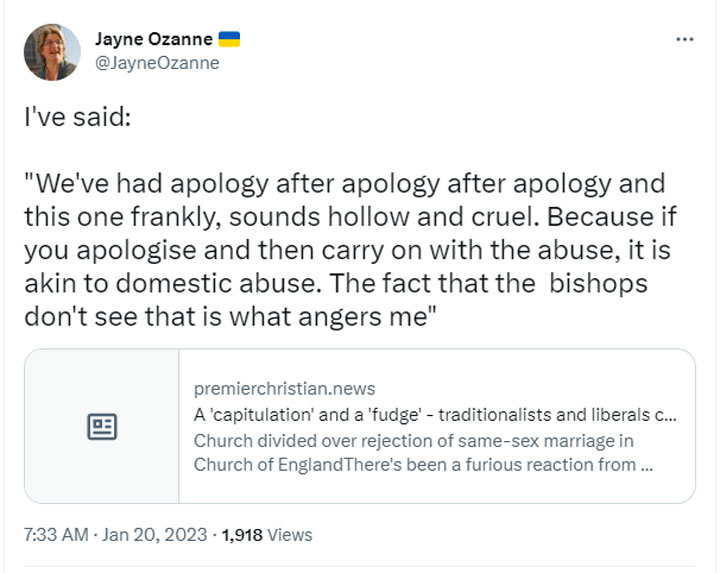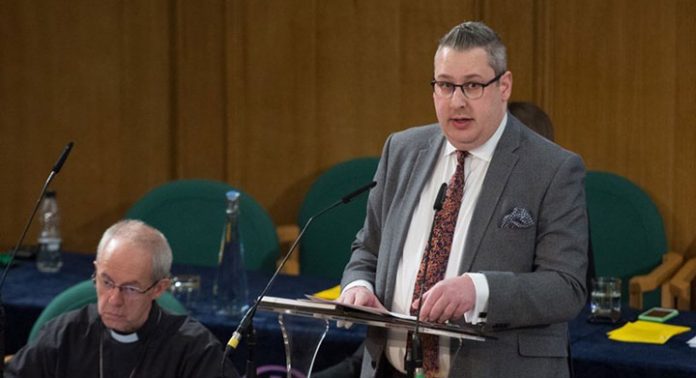Sam Margrave, a Christian on the Church of England’s General Synod, has been reported to police by the Diocese of Coventry and has even been sent a rebuke from the Archbishops of Canterbury and York.
But what did he actually say? Is the Church of England’s response truthful and proportionate or is it disingenuous and unreasonable?
Yes, it is an attempt to silence his views
Writing on behalf of the Diocese of Coventry, the Diocesan Registrar Jenny Dymond claims that social media posts by Sam Margrave are ‘abusive’ and ‘defamatory’, leaving the Diocesan Secretary “no option but to report the matter to the West Midlands Police.”
She claims that some of Mr Margrave’s content could be defamatory and/or could be regarded as harassment. She also warns about the Malicious Communications Act, though she doesn’t explicitly accuse Mr Margrave of breaching it.
It is one thing to argue against his tweets, but to suggest they are criminal and must be reported to the police is a whole different level.
This would ride rough shod through free speech protections in our nation as so powerfully set out by Lord Justice Sedley in the famous street preacher case of Redmond-Bate: “Free speech includes not only the inoffensive but the irritating, the contentious, the eccentric, the heretical, the unwelcome and the provocative, provided it does not tend to provoke violence. Freedom only to speak inoffensively is not worth having.”
So why would Sam Margrave’s tweets be reported to police? Why would a threatening letter be sent to Mr Margrave, mentioning criminal penalties like “up to six months in prison”?
Dymond was at pains to claim that “this letter is not an attempt to seek to prevent you from challenging matters, and for standing up for causes which you believe in”. But when a report has been made to the police based on such spurious claims of criminality, it is hard to see it as anything other than an intimidatory letter meant to silence Mr Margrave.
What did he actually tweet?
Although Dymond, on behalf of the Diocese of Coventry, lists six tweets as ‘offending posts’, she stresses that this is not an exhaustive list. Presumably, though, it contains what they believe to be the most egregious examples of his tweets – or at least representative.
Let’s take a look and see how awful they are.
1. “Queer theory as evil”
This is a typo on Dymond’s part– Mr Margrave wrote “queer theory is evil” on 25 January 2023.
This must be the simplest and most obvious example of a tweet that is not remotely criminal and expresses a genuinely held moral belief and in no way targets any particular individual.
The suggestion that this could amount to harassment, defamation or malicious communication is simply absurd.
This example alone demonstrates that it is Mr Margrave’s views that are being targeted, not merely his expression of them.
In fact, queer theory is in direct contradiction to the Church of England’s teaching on sex and marriage – this statement is no more than the application of official doctrine. As with Bernard Randall, those who believe the historic, orthodox, true Christian teaching on sexuality are being crushed by Church of England officials.
2. ‘Queer theology builds on the work of paedophiles’
Read that carefully. He didn’t make wide-reaching claims about all queer theologians being paedophiles, or supporting paedophilia. He said that it’s built on the work of paedophiles.
Again, this isn’t targeting anyone, nor is it making broad aspersions about anyone’s characters. Moreover, it is true.
Philosopher Michelle Foucault’s work is cited as foundational to queer theory and queer theology. Foucault argued that children could consent to sex, and has been publicly and credibly accused of sexually abusing boys in Tunisia.
John Money, whose work is foundational to current ideas about gender identity also argued for children being able to consent and encouraged some child patients to play sex games together.
While other examples could easily be cited, Mr Margrave’s statement targets no one in particular and is easily defensible.
3. ‘O look it’s the political activists doing the devil’s work in a dog collar’
This tweet was sent in the context of the promotion of an event advocating for queer holiness with a vocal pro-LGBT campaigner in the Church of England.
It is unclear why this is deemed offensive; the only tweet asking Mr Margrave to retract it appears to take offence at the phrase ‘dog collar’ – an extremely common informal term for a clerical collar which is not pejorative.
Other correspondence suggests that it is the reference to the devil that is offensive.
In this instance, Mr Margrave was more forthright. Some Christians would prefer less confrontational speech.
However, Mr Margrave’s tweet here is similar to the language of Jesus Christ himself who said of those who opposed him “you are of your father the devil” (John 8:44). He also called Pharisees ‘hypocrites’, ‘children of hell’, like ‘whitewashed tombs…full of dead people’s bones’ and ‘serpents’ and more within a single chapter of the Bible (Matthew 23).
If the standard being used for Mr Margrave was used of Jesus, the Church of England would assuredly find him guilty too.
Again, this is an opinion about morality and in no way criminal.
4. “…Pride is the Nation’s next Jimmy Saville….”
This tweet was following on from tweets that featured photos of children interacting at Pride events with people in hypersexualised costumes. In this case, the typo was his.
Mr Margrave was concerned about the sexualisation of children at Pride events. But more than that, he was concerned at how those who raise this concern are shut down – just as criticism of Savile was silenced because of his charitable work.
Keith Waters, a pastor and part-time caretaker recently won his legal case after he lost his job for saying that Pride events weren’t appropriate for children. Another pastor and evangelist, Josh Williamson faced threats of violence and calls for his church to be burnt down for criticising Pride.
The attacks and abuse Mr Margrave has faced prove that those that raise concerns are shut down – who would dare criticise Pride when this happens?
5. (To a fellow elected member of General Synod) “You don’t belong on General Synod. You belong on a register.”
The context of this tweet is important. The first tweet from @lordshaun_ entirely misrepresents the meaning of an earlier tweet by Harry Miller, which Margrave had liked. Further context shows Miller’s meaning (1, 2, 3) – in no way suggesting that all, or many ‘LGBTQI+’ people are paedophiles (or ‘nonces’) but that Pride and Drag events can be used as cover by those who are.
When Sam was attacked and misrepresented over this point, he doubled down, demonstrating that this kind of attack and misrepresentation of legitimate child safety concerns has the effect of protecting abusers.
The tweet may appear like a personal attack out of context – but he is responding to a dishonest misrepresentation of what he had said.
6. “You ARE doing the devil’s work while wearing a dog collar…”
This is the same point made as in tweet 3, though in this case applied to a particular person. The same points apply as elsewhere.
In conclusion: even if many people might advise a more reserved approach to tweeting and public engagement than Mr Margrave’s, these posts are all defensible, in context are more understandable and are certainly not criminal.
The Archbishops of Canterbury and York claim “they have failed to distinguish between serious allegations of criminal behaviour of specific individuals and the wider law-abiding LGBTQI+ community.” Only tweet 5, out of context, could come anywhere close to being interpreted in this way and it is specifically about giving cover to those who abuse.
Ironically, it is the church itself that is making serious allegations of criminal behaviour, with revisionist members making wildly disproportionate allegations against Mr Margrave and being backed to the hilt by the establishment.
What about Jayne Ozanne’s claim that the church’s teaching is abusive?
LGBT campaigner and fellow General Synod member Jayne Ozanne implicitly made some of the complaints against Mr Margrave.1 In tweets, she accused him of “deep-seated homophobia” and “abuse” and call him a safeguarding risk.
What then, do the bishops and archbishops make of her comparing historic, orthodox Christianity and those upholding it to domestic abuse?
[1] This tweet followed the next day by this tweet make the accusation against Mr Margrave implicitly.

Her tweet has had nearly 2,000 views. The Premier article containing the quote has no doubt been seen many more times.
How do the bishops feel about being compared to domestic abusers? Have they written to Ozanne to rebuke her and to apologise publicly for her language and the offence it causes to conservatives?
Ozanne may be highly skilful in disguising her attacks but is actively championing laws that would ban prayer for people with unwanted same-sex attraction. She is seeking to turn faithful pastors across the country into criminals.
Because conservatives on synod have good theological, biblical arguments on the topic of marriage and don’t resort to overblown complaints about opposition synod members in order to get their way, toxicity from revisionists is easily ignored by the Church of England hierarchy.
Not the only one
Mr Margrave is not the only one who’s faced this kind of attack. He is clearly more forthright than most and engages in Twitter discussions that get heated on both sides.
When standing for synod, he said what he would stand for. The people voted for him and he has done just what he promised.
He now not only faces the attacks and verbal abuse received from revisionists but the weight of the Church of England institution bearing down on him. For a man with disabilities and autism, this is a heavy burden – but he is seeking to honour Jesus Christ who is an expert at giving rest and relief to those who follow him.
1 This tweet followed the next day by this tweet make the accusation against Mr Margrave implicitly.










